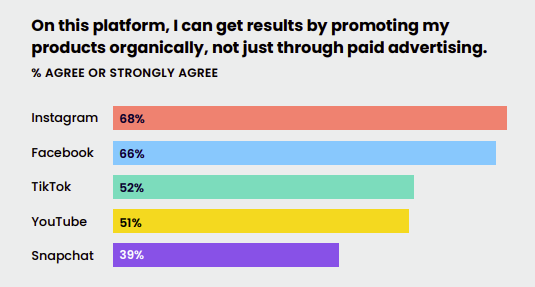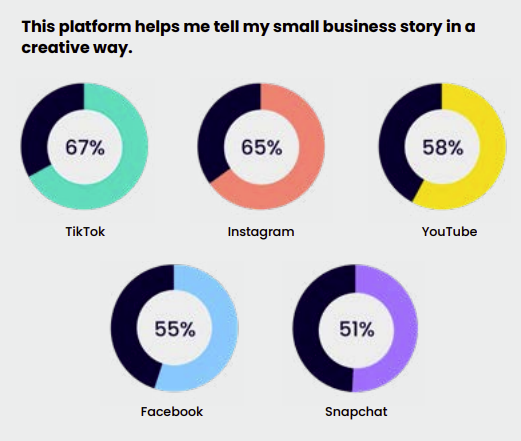“Best-Friend Brands”: The New Social Metric
Today In Digital Marketing is a daily podcast showcasing the latest in marketing trends and updates. This week, Tod touches on:
Determining Your Brand’s Best Friend
Why Social Ads Are Struggling
TikTok: Ad Slowdown? Not Us!
TikTok is Coming for SMBs
1 in 4 Apps Fear Shutting Down
Shoppable Ads Via TV
Microsoft Advertising Wants Your I.D.
Snapchat Test Spotlight Replies
Below is the transcription from this weeks topics
Determining Your Brand’s Best Friend
Sometimes, one of the tasks of a marketing person at a company, is to propose partnerships between their brand and another. This offers the opportunity of joint advertising campaigns (like Coca-Cola and McDonald’s), cause-based alliances (like Target and UNICEF), or even bundling products together — like the streaming deals that include joint Hulu and Spotify subscriptions.
But finding those partners isn't always easy. And determining whether your customers would be thrilled with an alliance or offended by it should be top of mind.
What if there were a measure of brand partnership potential? A score that would tell you which other organizations would make for great alliances.
That's what Pankhuri Malhotra set out to invent. She and her coauthor have published a paper in The Journal of Marketing called Leveraging Cofollowership Patterns on Social Media to Identify Brand Alliance Opportunities.
I spoke with her recently.
Dr. Malhotra: We found clusters of brands in these [social] networks — like Tesla connected to technology brands. We were finding brands like Nike connected to the NFL and NBA, based on how people were engaging with them.
Tod: Connected how? Grouping hashtags together? How did you link these companies with topics?
Dr. Malhotra: Followership activity. If I am following Tesla and Budweiser together, there will be a link between the two.
We looked into the entire brand audience of all these brands. So for Google, they have 20 million followers; NFL, they have 25 million followers. We looked into this common followership pattern.
It's not just one person whose following these two brands together, there are millions of folks… That range was very interesting to us, because in some way it was telling us “Hey, there's a potential brand alliance opportunity that the managers may not be aware of.”
Tod: I see. So the practical application of this is a way to identify potential partnerships between brands based on them having similar Twitter followings. Do I have that right?
Dr. Malhotra: Exactly. That's the objective.
You’ll hear the full interview tomorrow, exclusively on the Premium Podcast, which you can sign up to by going to TodayInDigital.com/premiumfeed
Why Social Ads Are Struggling
Earlier this week, we reported that agencies are forecasting a strong ad market for the second half of the year, but now that the softened economy is taking hold, interest rates and inflation are going up... some of those forecasts are beginning to change. And not for the better.
The global media investment firm Magna recently slashed its forecast for social media ad growth from 18% to 11%, according to its revised estimate for 2022.
The media agency identified two leading reasons for why social advertising is suddenly struggling:
The first: Audience saturation
Magna reports that reach and time spent with social apps are saturated in all advanced markets, and advertising growth in 2021 was almost entirely driven by pricing rather than volume. The plateauing in usage and ad impressions has become more apparent this year, and incumbent players have reported declines in some mature markets.
The second: Targeting restrictions
We are all aware that Apple’s privacy changes have made it more difficult for brands to reach target audiences on social media.
Magna notes that the greater anonymity made it more difficult for marketers to attribute consumer purchases to campaigns among different social media platforms. According to the report, the effect was gradual but was evident by the end of last year as social media advertising became less attractive, particularly for Meta and Snap.
The media agency also says the rise of TikTok in the U.S. poses an additional headwind for social platforms.
Looking forward, advertisers are likely to face increased privacy restrictions. Magna predicts that social media companies will become more attractive to advertisers through new services such as;
In-app commerce
Partnerships with retail media networks and more
TikTok: Ad Slowdown? Not Us!
Social media's golden child has a message for Zuck after hearing yesterday's news that Facebook plans to copy TikTok.
TikTok's president of global business solutions, Blake Chandlee, stated, "Facebook is a social platform... Ours is not," adding that TikTok is "an entertainment platform," CNBC reports. Positioning the company not as a social network, but as a digital medium.
Chandlee, who spent 12 years at Facebook before joining TikTok, also noted that if Facebook tries to copy TikTok, it will end up offering a sub-par experience to its users and brands.
Furthermore, he added that the company hasn't seen a slowdown in advertising, despite what agencies are projecting and companies like Meta are saying.
Quoting Chandlee:
I’ve heard there’s going to be a slowdown in the ad market, anywhere from 2% to 6%, but we have not seen it... We’re not seeing the headwinds that some others are seeing…
TikTok is Coming for SMBs
To rub even more salt on Zuck's wounds a study released yesterday found that while Facebook remains the social media platform of focus for SMBs, TikTok is on the rise.
The report found that Facebook and Instagram dominated as the top platforms that brands are using for their business, with TikTok and Snap falling behind.
Image: Hello Alice
When it comes to organic reach, over two-thirds of brands found Instagram to be the best platform for their business, with TikTok not far behind.
Image: Hello Alice
But, TikTok really shined when it came to the best app for creative expression and storytelling.
Two-thirds of small business owners said that the app helps them tell stories in a creative way, outpacing competitors including;
Instagram
YouTube, and
Facebook
Image: Hello Alice
TikTok is also getting noticed by SMBs based on other brand experiences. 4 out of 10 brands are now likely to join the platform because they’ve heard reports of efficacy from other business owners. By contrast, only 2 out of 10 said the same about Facebook.
Image: Hello Alice
Among those that have been using TikTok for marketing, nearly 60% indicated that the platform has positively affected their businesses. While 8 out of 10 brands plan to increase their marketing investment in the platform – beating out all the platforms surveyed.
Image: Hello Alice
Data has been provided by Hello Alice's survey of more than 800,000 SMBs.
1 in 4 Apps Fear Shutting Down
Over a quarter of apps expect to shut down due to the App-ocalypse, according to new research from ad tech company, Bango.
Image: Bango
As a result of Apple's IDFA changes, Google's phase-out of third-party cookies and government restrictions, app marketers and developers report that it has "never been more difficult" to acquire new paying users for their apps, according to the research.
Two-thirds of app marketers reported that acquiring new paying users is the most important aspect of their job. Yet, two-thirds indicated that they’re struggling to accurately target and reach paying users, and more than 60% have lost sleep over the matter.
In response to this new challenge, two-thirds of app marketers are seeking new, more privacy-friendly targeting techniques that don't rely on IDFA or cookies.
As a solution, Bango suggests its product ‘Purchase Behavior Targeting’ which allows app marketers to promote their apps based on similar products customers have already bought, without the need for cookies or IDFA tracking.
Shoppable Ads Via TV
The biggest retailer in the world is partnering up with a streaming giant in an attempt to make connected TV an e-commerce platform.
Yesterday, Walmart and Roku announced consumers will soon be able to purchase items with their remote while streaming Hell’s Kitchen (or any other Roku show).
Here's how it will work:
Roku will display Walmart's shoppable ads that will let viewers purchase featured products fulfilled by the retail giant.
Viewers press “OK” with the remote on an ad and proceed to checkout with their payment details pre-populated from Roku Pay.
By tapping "OK" on the Walmart checkout page, the order will be placed.
Finally, a purchase confirmation is emailed to the customer.
The shoppable ads will be powered and measured by OneView, Roku's ad-buying platform for TV streaming.
Microsoft Advertising Wants Your I.D.
Microsoft Advertising announced yesterday that it is implementing a new advertiser identity verification program to ensure consumers see ads from trusted sources.
Image: Microsoft
Now, advertisers will be required to undergo a verification process to establish their legal identity. Advertisers can use government-issued, photograph-included personal identity or business-related documents issued by appropriate regulatory authorities to complete the process.
Once completed, your verified advertiser details will be displayed to searchers on your ad.
Microsoft claims the process is highly automated and it has simplified "the procedure to ensure that advertisers can complete it quickly."
Snapchat Test Spotlight Replies
Snapchat is testing replies in its TikTok-inspired Spotlight feed.
Users will be able to reply directly to creators' videos in Spotlight as a way of commenting on videos, Axios reports.
Image: Social Media Today
A spokesperson confirmed yesterday that the feature called "Spotlight Replies" will be different from competitors in that replies will be private by default, but creators have the option to make them public.
According to Axios, Snapchat will test the new reply feature in New Zealand before rolling it out globally to all users.
Image: Social Media Today
Credit to Tod Maffin and the Today In Digital Marketing podcast, Produced by engageQ.com












